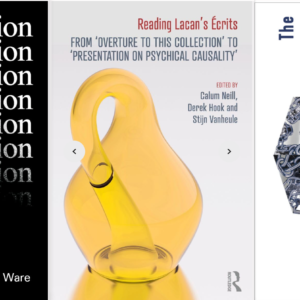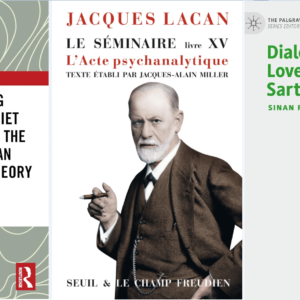News – May 2020
Want to receive this news via email each month? Sign up here.
20% off and free global shipping on all Routledge titles for LacanOnline.com readers. Use this link and code S031 at the checkout.
Published in the last month by Routledge was Danièle Brillaud’s Lacanian Psychoanalysis: A Clinical Casebook. Focusing specifically on the major concepts of the Écrits, Brillaud’s book examines clinical cases and treatment instances of patients across a spectrum of disorders, including delusional misidentification syndromes, paranoid psychosis, schizophrenia, hypochondria, Cotard delusion, and fetishism. Situating Lacan’s work in the context of the French psychiatry that influenced him, and of which he was a part, Brillaud’s book is based on her perspective as a practising analyst and former consultant psychiatrist in the French public hospital system. Order via Amazon, or direct from the publishers Routledge, where you get 20% off and free global shipping (on all Routledge titles) as a LacanOnline.com reader. Use this link and code S031 at the checkout.
Duane Rousselle’s Gender, Sexuality and Subjectivity: A Lacanian Perspective on Identity, Language and Queer Theory was also published last month in ebook form by Routledge (order via the publishers at the link at the top of this page for 20% discount). Rouselle challenges the dominance of the social constructionism paradigm in contemporary debates on gender and sexuality, and suggests that queer theory and intersectionality have reached a limit. Instead, he points to a “new logic of gender invention” which could open the way to an alternative paradigm of thought. The ebook is also available via Amazon and Google Play.
A Practical Way to Feel Better: San Francisco Seminars on Psychoanalysis, by Gerardo Arenas, takes its title from a quote from Lacan, and is based on two seminars the author gave in San Francisco in early March as part of the Freudian Field series. Its four chapters look at the symptoms of speaking bodies, the structure of interpretation, the economy of jouissance, and the enjoyment of life. It is Arenas’ tenth book but the first to appear in English. It is out now.
New out in June is Lacan the Charlatan by Peter D. Mathews. Starting from the comments made by Noam Chomsky in a 1989 interview that Lacan was “an amusing and perfectly self-conscious charlatan”, Mathews examines the arguments of key anti-Lacanians who have since jumped on this bandwagon to make similar accusations. Weighing and contextualising the legitimacy of Lacan’s engagements in other fields outside of psychoanalysis in order to enrich it, Mathews considers Lacan’s approach as an interrogation of authority and a contest to what he calls “untenable modes of mastery”. It is the latest title from the Palgrave Lacan Series, recent publications from which are here.
Looking ahead to releases due later in the year, August will see the release of Néstor A. Braunstein’s Jouissance: A Lacanian Concept, published by SUNY, with English translation by Silvia Rosman. Originally published in Spanish in 1990, and then translated into French and Portuguese, this new English translation of the Argentine-Mexican analyst’s work is especially welcome because it presents a cogent critique of a concept that is often referred to but little-challenged in the Lacanian world. Despite its many different faces, jouissance is alternately used as either the diagnosis, response, or solution for a wide range of contemporary discontents. Braunstein’s book retraces in detail the theoretical issues which drive the production of this concept, its successive developments, and its consequences for the theory of the unconscious and sexuality. The second part of the book is more clinically-focused, in which Braunstein presents jouissance in relation to the three classical Lacanian structures, and addiction, opening up a reflection on what this means for an ethics of psychoanalysis. Pre-order now for August delivery.
Newly-announced for release in October as part of the Palgrave Lacan Series is Leon Brenner’s The Autistic Subject: On the Threshold of Language, due to be published in October. Presenting a theory of autistic subjectivity from a Lacanian perspective, Brenner posits autism as a singular subjective structure, distinct from neurosis and psychosis, and proposes an “autistic linguistic spectrum” on the basis of the autistic subject’s relation to language. Brenner’s book also achieves a synthesis of contemporary work on autism, examining research mostly unavailable to English-speaking readers, including that by Jean-Claude Maleval, Éric Laurent, and Rosine & Robert Lefort. Pre-order now ahead of its October release.
Also due for publication at the end of October is Raul Moncayo’s The Practice of Lacanian Psychoanalysis: Theories and Principles. Using an Aristotelian framework as the starting point to examine different modes of knowing and not-knowing in psychoanalysis, Moncayo offers a new model of diagnosis based on fewer rather than more categories, and a distinction which will be appreciated by Lacanian scholars between surface symptoms and underlying structure. His book’s various chapters frame clinical practice in the context of topics such as resistance and the desire of the analyst, transference love as metaphor, and the end of analysis as an identification with the sinthome.
Announced for release in December is Jean-Claude Milner’s A Search for Clarity: Science and Philosophy in Lacan’s Oeuvre, with translation by Ed Pluth. A major voice in psychoanalysis in France for decades, Milner makes two key arguments in this book, which readers will find striking. First, that Lacan’s complete thought can be found in his published works alone, not in the transcribed Seminars, many of which remain unpublished. Second, that the major concern of Lacan’s work is the subject, and in particular that the subject of psychoanalysis is the subject of science. In the latter, Lacan’s project is an extension of that undertaken by Koyré and Kojève before him, in which the subject in modern science is based on mathematisation instead of the ancient episteme. It is available to pre-order now.
Lastly among new book announcements, Gabriel Tupinambá’s The Desire of Psychoanalysis: Exercises in Lacanian Thinking has been announced for publication in February next year. The book looks at the current state of institutional psychoanalysis and the Lacanian community, in particular with regard to its theoretical production, and aims to “locate sites for conceptual innovation… such as the understanding of the role of money in clinical practice, the place of analysands in the transformation of psychoanalytic theory, and ideological dead-ends that have become common sense in the Lacanian field.” Zizek writes its foreword. It can be pre-ordered now in advance of its release next year.
Among journals, following the rescheduling of the next WAP Congress which will now take place in Buenos Aires in December, the new issue of Scilicet, which follows the theme of the Congress, was released last month. ‘Dream, Its Interpretation and Use in Lacanian Treatment’, published by the World Association and distributed thanks to Lacanian Compass, contains many new and newly-translated texts into English from analysts of the WAP across six chapters, prefaced by an opening presentation by Jacques-Alain Miller. It is the eighth edition of Scilicet, a journal which began under Lacan’s direction in 1968 and was revived in its modern form in 2006.
The latest edition of The Lacanian Review is now available. TLR 9 is entitled Still Life?, capturing a painterly gesture and an orientation towards the drive which forms the background to many of its articles. These include English and French versions of a piece by Lacan, given the title ‘The Lacanian Phenomenon’, as well as some by prominent Lacanians within the NLS such as Miller, Laurent, Stevens and Voruz. The journal’s online edition, the Lacanian Review Online continues to publish short commentary pieces on a daily basis, dealing in particular with the response to the COVID-19 pandemic. Subscribe to receive these via email here.
For Danish readers, the fifth issue of the peer-reviewed journal, Lamella, on Freud and Lacan and theoretical psychoanalysis has just been published. This edition, along with the archive of past issues dating back to 2016, are also available to read in full via the link above.
Among new free-to-access papers, Mark Featherstone’s paper ‘Apocalypse Now!: From Freud, Through Lacan, to Stiegler’s Psychoanalytic ‘Survival Project’, from the International Journal for the Semiotics of Law last month, may be of interest. Featherstone explores the value of psychoanalysis through Bernard Stiegler’s work on computational madness, and what Featherstone labels as the latter’s apocalyptic ‘survival project’.
Lacanian psychoanalyst Darian Leader shares his thoughts on the human effects of the COVID-19 pandemic in an interview for Huffington Post India. Read it here. Some of Leader’s recent books – Why People Get Sick, The New Black, and of course, Hands: What We Do with Them and Why seem especially apposite in the current times.
Dr Derek Hook, author of Six Moments in Lacan and co-editor of the Palgrave Lacan Series, has started a YouTube channel which offers a series of lectures on key psychoanalytic concepts from Freud and Lacan’s work. These include a series on the mirror stage, the Lacanian unconscious, Freud’s dream theory, and jouissance. As with all of Hook’s work, it is accessible yet rigorous and these lectures are presented with verve, wit, and passion. Subscribe to the channel and click the bell icon to be notified when new videos are released.
Turning to events, The Freud Museum London’s online talk ‘What does the app want? A psychoanalytic reading of dating apps’, with Carolina and Arturo Bandinelli, will take place 24th June. Applying Lacanian theory to the analysis of empirical data, the pair will explore “the structural functioning of dating apps and the ways in which they activate, exploit and turn the subject’s fantasy.” Tickets can be booked here, and recordings will be made available to ticket holders for 10 days after the event.
Lacanian Compass has published its programme of events for June, which will be held exclusively online while pandemic restrictions are still in effect. Some events are open for all and some for members, so see the group’s site for full details, timezones, and how to get Zoom details.
The London Society of the New Lacanian School will be finishing its online seminar series reading Lacan’s Seminar XVII: The Other Side of Psychoanalysis in early July. The remaining schedule and details of how to join are available here. Recordings of previous presentations – following each of the chapters in the Seminar sequentially, are also available at the bottom of that page.
Finally, anyone interested in psychoanalysis will be pleased to know that, following the new collection of selected works by Jean Laplanche which was published by UIT Books last month under the title The Unfinished Copernican Revolution, all three volumes of collected essays between 1967-2006 are available as a bundle deal at a 50% discount from the publisher. The offer only lasts until the end of June so order now.
Got news? Get in touch.




Sometimes you get the sense authors don’t want you reading their books, $141(Aus) for Lacan the Charlatan? Why are some of these titles so expensive?
Not sure it’s the authors. “The Palgrave Lacan Series” – is well known for its VERY high prices. Adding the shipping costs which are also so high these months (Esp. International shipping)- It’s very frustrating and sad. Perhaps they are trusting academic institues libraries, with almost unlimited budgets, or very rich readers to order.